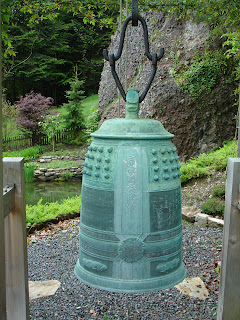Days, words, events, even blogs are temporary. Being away from blogs is temporary. The weeks in preparation for David Loy's appearance for the 10th Annual Ryokan Lecture have been busy as I've eased back into daily life in Olympia. Or did I come crashing in? Believe me, the sense of light is an extraordinary change when someone is attuned to light, landscape, and color. We had the coldest April on record and perhaps not the wettest, but it was plenty wet and grey, gray. Payne's gray. We are still getting only an occasional brilliant sky which is followed by another long period of falling water.

Loy began the workshop on Saturday by telling us about the origin of his writing the book, LACK AND TRANSCENDENCE and about the trilogy of his books, the connected unfolding and exploration of his basic thesis in Buddhist studies. From there, we moved into a day of dialogue with him that flowed from the nature of the Self/No-Self to the work of the Self/No-Self in the social context. From there we discussed the importance of story in the human experience and then ended with specific questions about the book LACK AND TRANSCENDENCE which the Sangha had taken up for its annual study. For me, I took not one note but listened intently allowing the teaching to wash through me as the Dharma soaks into the blood. I apologize that I have not one quote to give you which you may have been hoping for, to give you the feeling that you were there. You can find Loy's work online and make your way to the text of his lecture on Healing Ecology at
David Loy's website.
So, it was a rich exchange over this weekend. Now we go forward with daily life, Zazen each morning, and preparing for A DAY OF PRAYER AND HEALING FOR JAPAN on May 21. More thoughts to come as I begin to gather myself together and still transition into life in the north.
I think I'll include a very recent poem which speaks to grief, art, expression, loss, the human condition.
“Trodden Weed”
The title does not reveal the power of the man’s boots,
his determined stride across a deserted, colorless plain
somber snowy hill in the distance. No sky. Just the hem
of a black coat brushed at the top of the painting.
This is all Wyeth gives us
except for the single weed beneath the right forward foot
that must be searched out on the landscape as it disappears
in the tangled wintry meadow. It’s a nameless
thing, the weed, snuffed out by capricious footfall
a juxtaposition of place and time
of purpose and what is easily broken. We’d almost expect
to see spurs, the buckle fed through a notch on the bridge
of the ankle. These large feet suggest lungs that heave
with the effort of movement. And yet, and yet
we know nothing of this man
where he is going or coming from. What of his hands?
Does he carry a rifle? Is there anger in his stride?
Is he walking toward rescue, vengeance, or is it escape?
Is he sure of himself, or turning from sorrow?
Is he moving toward someone he loves?
It’s as if these boots that can tread on fields with ease
are shielding a wound, a grief so deep
that someone can’t survive except by edge and sway.
A loss that eats the heart from inside out
freezes tears in their welling.





